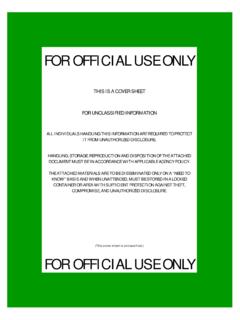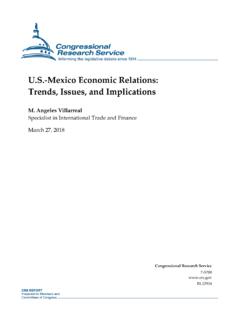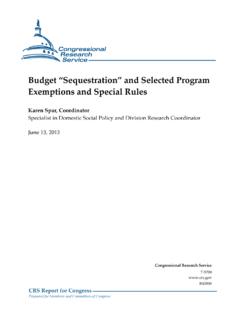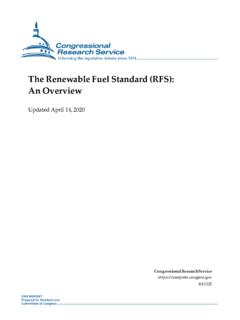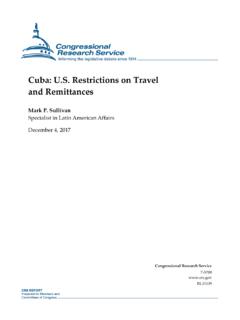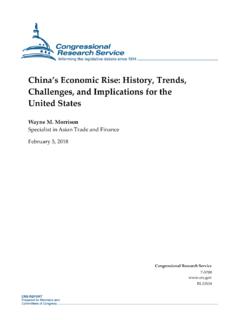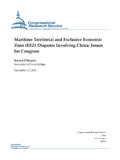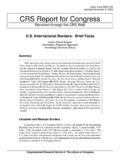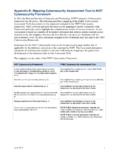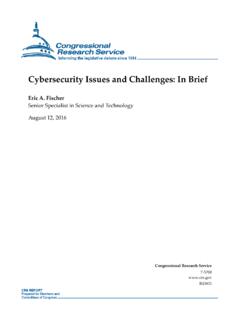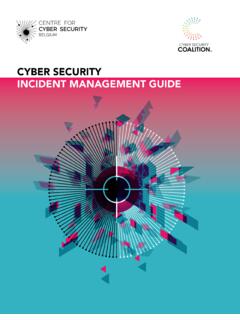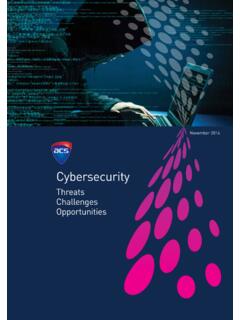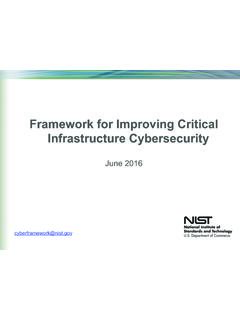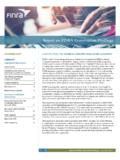Transcription of Federal Laws Relating to Cybersecurity: Overview of Major ...
1 Federal laws Relating to cybersecurity : Overview of Major Issues, Current laws , and Proposed Legislation Eric A. Fischer Senior Specialist in Science and Technology December 12, 2014 Congressional Research Service 7-5700 R42114 Federal laws Relating to cybersecurity : Major Issues, Current laws , Proposed Legislation Congressional Research Service Summary For more than a decade, various experts have expressed increasing concerns about cybersecurity , in light of the growing frequency, impact, and sophistication of attacks on information systems in the United States and abroad. Consensus has also been building that the current legislative framework for cybersecurity might need to be revised. The complex Federal role in cybersecurity involves both securing Federal systems and assisting in protecting nonfederal systems.
2 Under current law, all Federal agencies have cybersecurity responsibilities Relating to their own systems, and many have sector-specific responsibilities for critical infrastructure (CI). More than 50 statutes address various aspects of cybersecurity either directly or indirectly, but there is no overarching framework legislation in place. Revisions to many of those laws have been proposed over the past several years. Recent legislative proposals, including many bills introduced in recent Congresses, have focused largely on issues in several broad areas, including the following: Protection of Privately Held Critical Infrastructure (CI) Sharing of cybersecurity Information Among Private and Government Entities, Department of Homeland Security Authorities for Protection of Federal Systems, Reform of the Federal Information Security Management Act (FISMA), cybersecurity Workforce, and Research and Development.
3 Other Topics including cybercrime law, data breach notification, and defense-related cybersecurity have also been addressed in legislative proposals. At least some of the bills addressing those areas have proposed explicit changes to current laws . However, no bills making such revisions were enacted until the end of the 113th Congress. In the 112th and 113th Congresses, several bills that specifically focused on cybersecurity received committee or floor action. Comprehensive legislative proposals in the 112th Congress included the cybersecurity Act of 2012 (S. 3414), recommendations from a House Republican task force, and a proposal by the Obama Administration. S. 3414 was debated in the Senate but failed two cloture votes. In the absence of enactment of cybersecurity legislation in that Congress, the White House issued Executive Order 13636, with provisions on protection of CI, including information sharing and standards development.
4 In the 113th Congress, several narrower House bills addressed some of the issues raised and recommendations made by the House task force. Four had passed the House in the 112th Congress but were not considered by the Senate. They were reintroduced and passed the House again, with some amendments: Federal laws Relating to cybersecurity : Major Issues, Current laws , Proposed Legislation Congressional Research Service The Cyber Intelligence Sharing and Protection Act ( 624) focuses on information sharing and coordination. The cybersecurity Enhancement Act of 2013 ( 756) and the Advancing America s Networking and Information Technology Research and Development Act of 2013 ( 967) address Federal cybersecurity R&D and technical standards.
5 The Federal Information Security Amendments Act of 2013 ( 1163) addresses FISMA reform. Also passing the House were three bills that address the role of the Department of Homeland Security (DHS) in cybersecurity : The CIRDA Act of 2013 ( 2952), the Homeland Security cybersecurity Boots-on-the-Ground Act ( 3107), and the National cybersecurity and Critical Infrastructure Protection Act of 2013 ( 3696). They include provisions on workforce, R&D, information sharing, and public/private sector collaboration in protecting CI. Three Senate cybersecurity bills passed in the 113th Congress: The DHS cybersecurity Workforce Recruitment and Retention Act of 2014 (S. 2354), bill addressing workforce issues, passed the Senate as an amendment to S.
6 1691. The National cybersecurity Protection Act of 2014 (S. 2519) provides authorization for a DHS information-sharing center. The Federal Information Security Modernization Act of 2014 (S. 2521), addresses FISMA reform. Four of the bills, as amended, were enacted at the end of the 113th Congress: 2952, S. 1691, S. 2519, and S. 2521. The bills address FISMA reform and DHS workforce issues and information-sharing activities. Federal laws Relating to cybersecurity : Major Issues, Current laws , Proposed Legislation Congressional Research Service Contents Current Legislative Framework .. 2 Executive Branch Actions .. 3 Proposed Legislation .. 6 Selected Legislative Proposals in the 112th and 113th Congresses .. 7 Selected Issues Addressed in Proposed Legislation.
7 12 Discussion of Proposed Revisions of Current Statutes .. 28 Posse Comitatus Act of 1879 .. 29 Antitrust laws and Section 5 of the Federal Trade Commission Act .. 30 National Institute of Standards and Technology Act .. 32 Federal Power Act .. 33 Communications Act of 1934 .. 34 National Security Act of 1947 .. 35 Information and Educational Exchange Act of 1948 (Smith-Mundt Act) .. 36 State Department Basic Authorities Act of 1956 .. 37 Freedom of Information Act (FOIA) .. 37 Omnibus Crime Control and Safe Streets Act of 1968 .. 39 Racketeer Influenced and Corrupt Organizations Act (RICO) .. 39 Federal Advisory Committee Act (FACA) .. 40 Privacy Act of 1974 .. 40 Counterfeit Access Device and Computer Fraud and Abuse Act of 1984.
8 41 Electronic Communications Privacy Act of 1986 (ECPA) .. 42 Department of Defense Appropriations Act, 1987 .. 45 High Performance Computing Act of 1991 .. 46 Communications Assistance for Law Enforcement Act of 1994 (CALEA) .. 47 Communications Decency Act of 1996 .. 47 Clinger-Cohen Act (Information Technology Management Reform Act) of 1996 .. 48 Identity Theft and Assumption Deterrence Act of 1998 .. 50 Homeland Security Act of 2002 (HSA) .. 50 Federal Information Security Management Act of 2002 (FISMA) .. 53 Terrorism Risk Insurance Act of 2002 .. 57 Cyber Security Research and Development Act, 2002 .. 57 E-Government Act of 2002 .. 58 Identity Theft Penalty Enhancement Act .. 59 Intelligence Reform and Terrorism Prevention Act of 2004 (IRTPA).
9 61 Figures Figure 1. Simplified Schematic Diagram of Federal Agency cybersecurity roles .. 4 Ta b l e s Table 1. Selected Bills Addressing cybersecurity Issues that Received Committee or Floor Action in the 113th Congress .. 11 Federal laws Relating to cybersecurity : Major Issues, Current laws , Proposed Legislation Congressional Research Service Table 2. laws Identified as Having Relevant cybersecurity Provisions .. 62 Contacts Author Contact 72 Acknowledgments .. 72 Federal laws Relating to cybersecurity : Major Issues, Current laws , Proposed Legislation Congressional Research Service 1 or more than a decade, various experts have expressed concerns about information-system security often referred to more generally as cybersecurity in the United States and The frequency, impact, and sophistication of attacks on information systems and networks have added urgency to the Consensus has also grown that the current legislative framework for cybersecurity might need to be revised to address needs for improved cybersecurity , especially given the continuing evolution of the technology and threat environments.
10 This report, with contributions from several CRS staff (see Acknowledgments), discusses that framework and proposals, starting with the 111th Congress, to amend more than 30 acts of Congress that are part of or relevant to it. It includes a discussion of legislative issues and activity in the 113th Congress (see Selected Issues Addressed in Proposed Legislation ). For a CRS compilation of reports and other resources on cybersecurity , see CRS Report R42507, cybersecurity : Authoritative Reports and Resources, by Topic, by Rita Tehan. For additional selected CRS reports relevant to cybersecurity , see CRS Issues Before Congress: cybersecurity . 1 The term information systems is defined in 44 3502 as a discrete set of information resources organized for the collection, processing, maintenance, use, sharing, dissemination, or disposition of information, where information resources is information and related resources, such as personnel, equipment, funds, and information technology.


